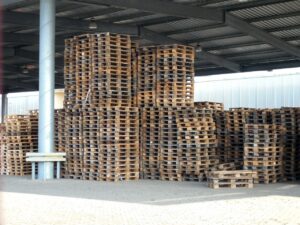1. Bamboo Wind chimes
In-Depth Process:
- Select bamboo rods of different lengths to create varying tones.
- The longer the bamboo piece, the deeper the sound it produces.
- Cut the bamboo into tubes, leaving one end closed for each piece to act as the “clapper.”
- Smooth out the edges using sandpaper to prevent splinters.
- Drill small holes near the open end of each bamboo tube, then string them together using durable twine or fishing line.
- Hang them from a wooden or bamboo frame and adjust the lengths so the tubes knock against each other when moved by the wind.
Final Touch: You can paint the bamboo or apply a clear varnish to enhance durability, especially if used outdoors.
2. Bamboo Picture Frame
In-Depth Process:
- Cut thin bamboo strips to the size of your desired frame.
- Make two pairs of strips for the top and bottom.
- Use a small hand saw or craft knife to create 45-degree angles at the ends of each strip for clean, mitered corners.
- Glue the corners together using a strong adhesive. For added strength and a rustic look, wrap twine or jute around each corner.
- Cut a piece of cardboard or sturdy material to serve as the backboard, and attach it with glue or small clips.
- Insert a glass or plastic sheet to protect the picture.
Final Touch: You can use a dark stain or leave the bamboo in its natural color for an earthy aesthetic.
3. Bamboo Candle Holders
In-Depth Process:
- Choose thick bamboo rods with a diameter that will fit your tea light or small candles.
- Cut the bamboo into shorter sections, roughly 4-6 inches tall, depending on your design preference.
- Hollow out the top part of the bamboo enough to hold a candle securely. You can use a drill or knife for this task.
- For decorative purposes, carve patterns, holes, or intricate designs into the sides of the bamboo.
- Sand the bamboo smooth and seal it with a varnish to ensure it’s fire-safe.
Final Touch: Group several candle holders of different heights together to create an eye-catching display.
4. Bamboo Plant Stand
In-Depth Process:
- Start by cutting bamboo rods into equal lengths for the vertical supports of the stand. The number of rods will depend on the desired size and shape.
- Cut additional bamboo pieces for horizontal supports and shelves. The shelves can be bamboo trays, boards, or slats tied together with twine.
- Use twine or screws to secure the joints where the vertical and horizontal pieces meet, ensuring the structure is stable and can hold the weight of the plants.
- Stack the shelves at different heights to create a multi-level plant stand.
Final Touch: You can paint or stain the bamboo to match your interior or leave it in its natural form for a minimalist look.
5. Bamboo Wall Art
In-Depth Process:- Cut thin bamboo sticks into varying lengths depending on the design or pattern you want to create.
- Arrange the bamboo pieces into geometric shapes, mandalas, or abstract patterns.
- You can glue them onto a canvas, wooden board, or directly on a wall.
- Consider staining some of the bamboo pieces in different shades to add dimension and contrast to your design.
- Attach a hanging mechanism if needed, such as a wire or sturdy string, to mount the finished artwork on the wall.
6. Bamboo Coasters
In-Depth Process:- Cut bamboo strips into small, uniform pieces (around 4-6 inches long) for rectangular coasters or use thin bamboo slices for round coasters.
- Arrange the bamboo pieces side by side, and glue them together onto a cork or felt backing for stability and slip-resistance.
- Sand the edges smooth and coat the coasters with a waterproof varnish to protect them from water damage.
- Add decorative elements like twine or burned patterns using a wood-burning tool.
7. Bamboo Hanging Shelves
In-Depth Process:- Cut bamboo rods to your desired shelf width. Cut four rods for each shelf you plan to make.
- Use a wooden or bamboo plank as the actual shelf surface. Drill holes in each corner of the plank, and thread twine through the holes to attach the bamboo rods.
- Stack multiple shelves by knotting the twine at intervals to secure the shelves in place. Make sure the knots are even to maintain balance.
- Tie the top of the twine into a loop for hanging.
8. Bamboo Garden Trellis
In-Depth Process:
- Measure and cut bamboo poles to the height and width of your desired trellis. For a simple design, arrange three bamboo poles into a triangular teepee shape, tying them together at the top with strong twine or wire.
- For more intricate trellises, criss-cross bamboo poles horizontally and vertically, tying them at the intersections.
- Secure the base of the trellis into the ground to ensure it is stable enough to support climbing plants.
Final Touch: Stain or coat the bamboo with weatherproof varnish to increase durability in the garden.
9. Bamboo Soap Dish
In-Depth Process:
- Cut bamboo strips into thin, uniform lengths for the base and sides of the dish. You’ll need longer pieces for the base and shorter pieces for the sides.
- Arrange the base strips side by side with small gaps between each strip to allow water to drain.
- Glue or tie the side strips to the base, forming a small box.
- Sand the edges to smooth them and ensure the soap dish won’t scratch your countertop.
- Apply a waterproof finish to protect the bamboo from soap residue and moisture.
Final Touch: Use natural materials like jute to wrap around the edges for added decoration.
10. Bamboo Lantern
In-Depth Process:
- Cut bamboo slats or thin rods and arrange them into a box or cylindrical shape to form the frame of the lantern.
- Use a bamboo or wooden base to secure the bottom, leaving an open top for air circulation.
- You can also incorporate thin bamboo strips in crisscross patterns or weave them for added texture.
- Place a candle or LED light inside the lantern.
Final Touch: Add handles made from rope or wire, and decorate the bamboo lantern with cutouts or carvings for an intricate glow.






